Session Notes: Using Evidence and Collaboration for Setting and Defending Priorities
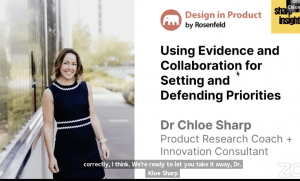
— Thank you for introduction and pleased to be here at this conference, so I’ll talk about using evidence and collaboration for setting priorities
- Looking forward to hearing questions at the end

— Only 33% of businesses conduct research across the product lifecycle
-
This is something I observed myself with start-ups and scale-ups
-
It was a foundation for writing “Make Products That Matter”, given tremendous value in UXR across product lifecycle
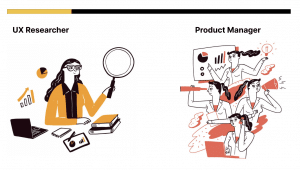
— I’ll now give a bit of history and context about myself
-
Used to work as social researcher in customer experience team, and met people win other research domains and found it fascinating to learn how people behave, their motivations, and designing products
-
I then worked as UXR at AI startup and won award and funding from design foundations, and worked on applying them
— Cofounded user market research company, where they did grant writing
-
Interesting to work with companies that couldn’t otherwise afford to do research and worked with tech start-ups and doing UXR helped uncover mistaken assumptions, and let them pivot
— Then worked as PM in finance company
-
Bought UXR and design thinking and looked at problem and took UXR perspective, which product team hadn’t done before
-
Team was organized in a waterfall manner
-
-
Interesting to see what user problem was and do research at a late stage
-
Brought to certain point and took it to next level to be product managers
-
-
Hired product coach to have people in product team come together to grasp strategy and underlying vision, along with role of product manager
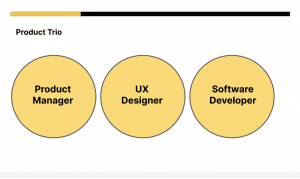
— Then got into a product trio above
-
Interesting dynamic, in that I came in as manager, had work experience as UXR, but current company was different, and relied on external contractors
— In-time, we hired an in-house UX designer, but software developer role was external
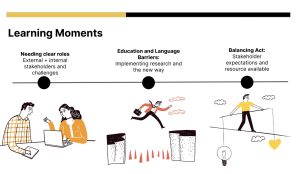
— Going from UXR to PM was interesting journey and highlighted three main learning moments had and they resonate and cross-over
-
Clear roles as product trio dynamic changed
— Self and designer along with team
-
Lot of communciation around roles and responsibilities
-
UXR had to be shared with others in way that made sense
— Did a lot of research in the role
-
Developed documentation and recommendations for roadmap
— As someone fairly new to Lean UX, recognized language barriers, and had to upskill my ability to communicate the value of research, as there were people who had more of a waterfall management style
-
Found it helpful to take stakeholder on research journey with me, and included them in user interviews
— Balancing expectations
-
Balanced stakeholder expectations and it’s costs as well and how resources could be allocated across the team, as well as make decisions across the team
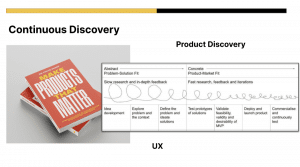
— In Make Products that Matter
-
UXR cadence is slow and project based, but as you progress through product development journey gets faster in terms of feedback you can get
— Interested in how we almost got caught in build trap, but got involved in continuous discovery for evidence and insights
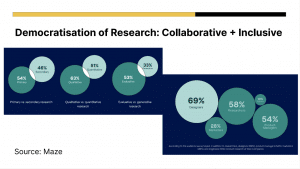
— Highlighted democratization of research, and bringing stakeholders on journey,
-
Included up-skilling customer success
-
Having more perpsectives in research helped provide more perspectives in setting priorities
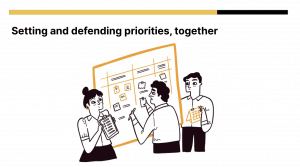
— And for setting priorities
-
Since it was collaborative, built out a culture of research and design within the company
— How to do it
-
Bring in stakeholders and upskill each other in the team–including team leaders and the designers and researchers (through understanding the business logic)
— In terms of the product roadmap, having a high-level and having plan in mind, helps put people’s minds at rest
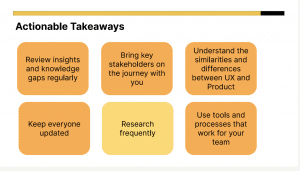
— In terms of actionable takeaways:
-
Bring people with you on the journey,
-
Lots of communication
-
Seeking out tools in your environment, and keep reviewing insights regularly
-
Grasping similarities and differences, and how far UXR could take me as a product manager
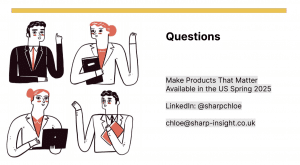
— That’s all. Any questions?
-
When bringing stakeholders to user interviews, how were they prepared for interviews and synthesis after the fact?
— For interview: Put together a document that had outline of research aims, method used, people involved, and participant information
-
Shared document to figure out what to achieve for interviews
-
Encouraged people to sit in and listen, and emphasize focus on data collection
-
20% talking and 80% data
— For synthesis: Did debriefing and used affinity mapping to get stakeholders involved to advocate for the users, and ge into their mindset
-
Particular types of research activities that work to clarify priorities?
— For product features, form of user acceptance testing and detailed analysis, and MOSCOW method for organizing features
-
Useful for software developers
-
Best tools and methods for keeping people updated and communicating across teams?
— Weekly meetings and used Teams and Asana board for key products and more detailed backlog for features and not testing things and went through that weekly with developer
-
Didn’t tell about granular details
-
Had Slack channel for questions
-
What did you have to unlearn as being PM?
— Thinking about both user product and business, instead of just thinking about the user in UXR
— Focus on stakeholder management, and expectations and how it was portrayed and a bit too much
-
Understanding line between useful and meaningful information
-
Turning insights into avenues for future research for continuous discovery?
— Recommend frequent reflecting through research process and getting other people involved with research process, and what things may look like
-
Get in the habit of looking for opportunities
-
Who represents engineering within the product trio?
— Ideally good to have 1-2 engineers, since team was small. Personally not strict on specific roles
-
Process of upskilling non-research folks?
— Primarily learning by doing, as artifacts like a glossary had limited effectiveness,
-
Tips on overcoming research team reluctance, for having other experts contribute to UXR domain?
— Able to do so much more research by having other people involved and restrictions in time, and doing as much as possible
-
Know if you trained people to point where they can do research and saw process that went into documentation and ethics
-
Looking at data and overseeing it
-
-
Over-time stakeholders got more confident in asking questions

